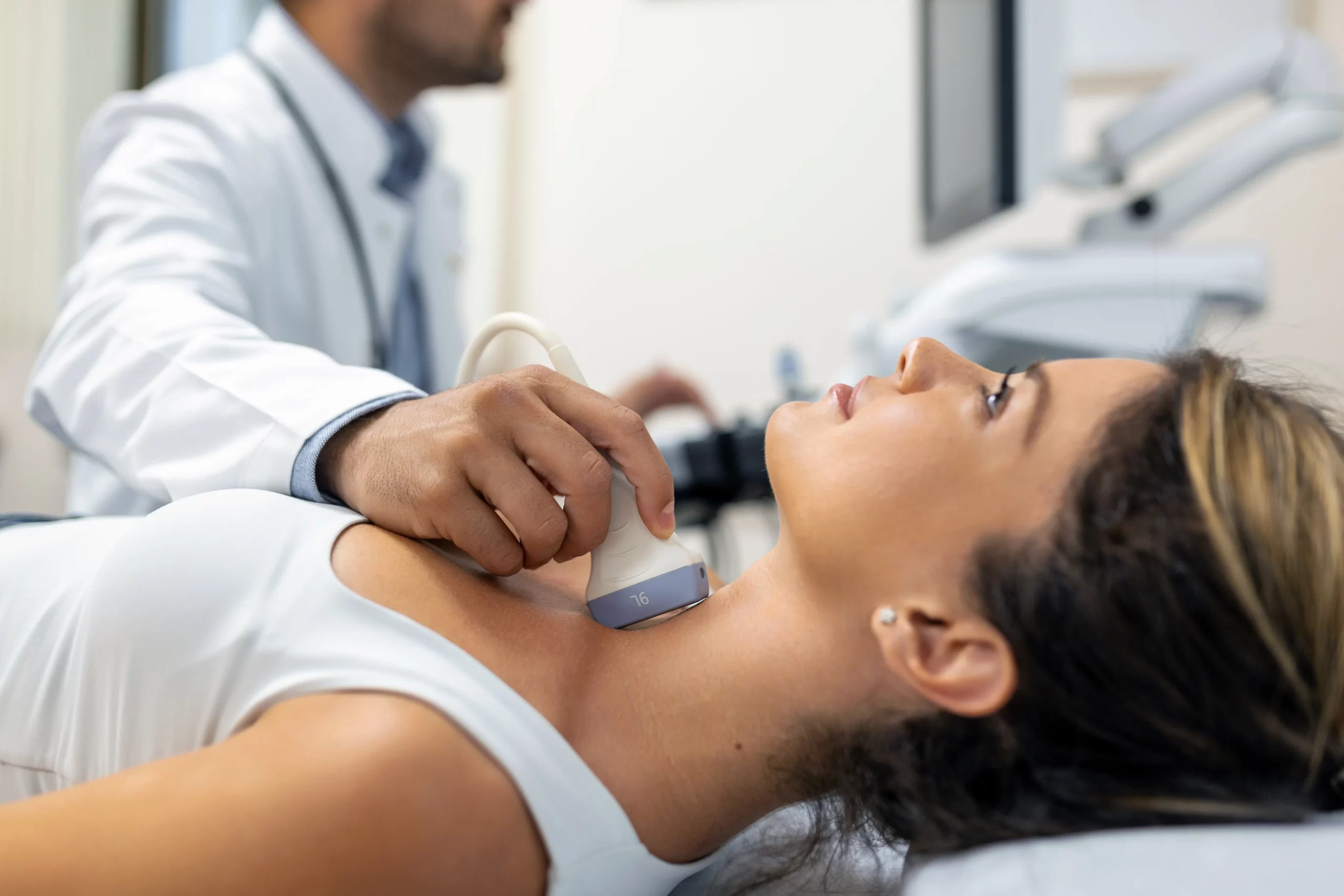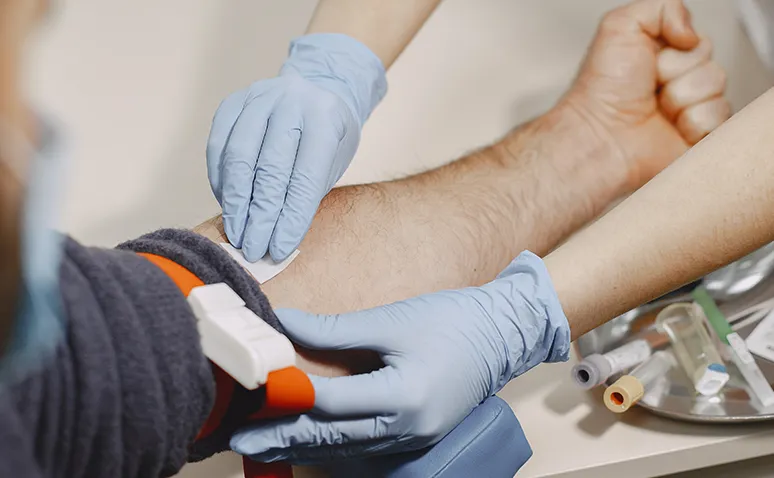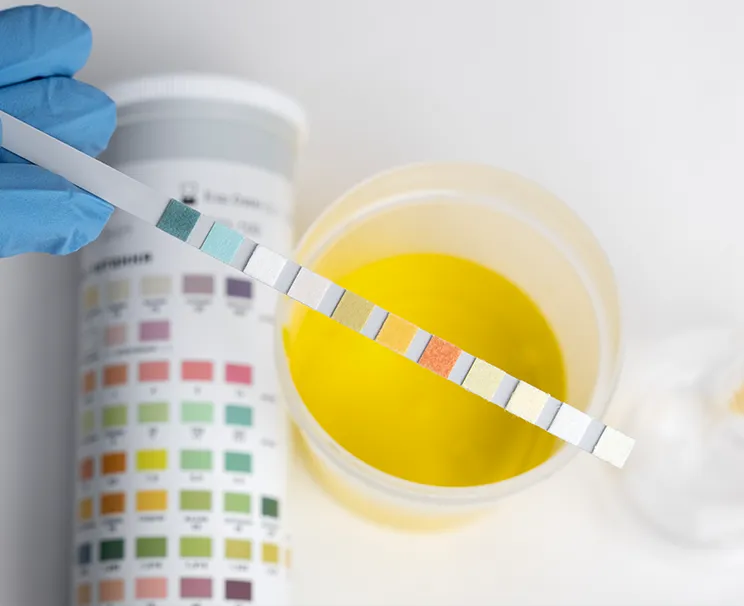What are thyroid tests? Thyroid tests are blood tests conducted to determine whether the thyroid gland is functioning properly. These tests measure thyroid hormone levels and are used to diagnose conditions such as hypothyroidism (underactive thyroid) or hyperthyroidism (overactive thyroid). The most common thyroid tests include TSH (Thyroid-Stimulating Hormone), T3 (Triiodothyronine), and T4 (Thyroxine).
What are thyroid tests? These tests determine the levels of active thyroid hormones circulating in the bloodstream. Additionally, Anti-TPO (Anti-Thyroid Peroxidase Antibody) and Anti-TG (Anti-Thyroglobulin Antibody) tests may be performed to diagnose autoimmune thyroid disorders. Elevated levels of these antibodies can indicate Hashimoto’s thyroiditis or Graves’ disease, which are immune system-related thyroid disorders.
Stages of Thyroid Testing
- Doctor Consultation and Test Decision
- Blood Sample Collection
- Laboratory Analysis
- Evaluation of Results
- Treatment and Follow-up Process

How Are Thyroid Tests Performed?
Thyroid tests are laboratory tests used to evaluate thyroid function and detect potential disorders. Since the thyroid gland produces hormones that regulate metabolism, these tests are essential for general health.
If a thyroid disorder is suspected, the doctor will first assess the patient’s symptoms and order the appropriate tests. These tests help diagnose hyperthyroidism (overactive thyroid) or hypothyroidism (underactive thyroid).
A fundamental test for evaluating thyroid function is TSH measurement.
- Elevated TSH levels indicate hypothyroidism (an underactive thyroid).
- Low TSH levels suggest hyperthyroidism (an overactive thyroid).
Alongside TSH testing, the levels of T3 (Triiodothyronine) and T4 (Thyroxine), which are actively circulating thyroid hormones, are also measured to gain further insight into thyroid function.
The blood test is typically performed in the morning and on an empty stomach. A blood sample is drawn from a vein in the arm, analyzed in the laboratory, and results are usually available within a few hours to a few days.
If an autoimmune thyroid disorder is suspected, Anti-TPO (Anti-Thyroid Peroxidase Antibody) and Anti-TG (Anti-Thyroglobulin Antibody) tests may also be requested.
Thyroid tests are essential for early diagnosis and proper treatment. Individuals experiencing persistent fatigue, weight changes, or low energy levels should consult their doctor and undergo these tests when necessary.
Is Fasting Required for a Thyroid Test?
One of the most frequently asked questions about thyroid tests is whether fasting is required.
- Thyroid function tests generally do not require fasting and can be performed at any time of the day.
- However, some doctors recommend fasting before a TSH test, particularly if it is conducted in the morning, as TSH levels fluctuate throughout the day and tend to be most stable in the morning.
The requirement for fasting depends on the specific test being conducted.
- Free T3 (fT3), Free T4 (fT4), TSH, and thyroid antibody tests do not require fasting.
- However, if additional tests, such as blood sugar or cholesterol measurements, are being performed, the doctor may request fasting beforehand.
Patients taking thyroid medications should consult their doctors before testing, as these medications can influence test results. In some cases, it may be recommended to withhold thyroid medication before the test to ensure accurate results.

What Are Thyroid Tests?
What are thyroid tests? Thyroid tests are blood tests conducted to determine whether the thyroid gland is functioning properly. These tests measure thyroid hormone levels and are used to diagnose conditions such as hypothyroidism (underactive thyroid) or hyperthyroidism (overactive thyroid). The most common thyroid tests include TSH (Thyroid-Stimulating Hormone), T3 (Triiodothyronine), and T4 (Thyroxine).
What are thyroid tests? These tests determine the levels of active thyroid hormones circulating in the bloodstream. Additionally, Anti-TPO (Anti-Thyroid Peroxidase Antibody) and Anti-TG (Anti-Thyroglobulin Antibody) tests may be performed to diagnose autoimmune thyroid disorders. Elevated levels of these antibodies can indicate Hashimoto’s thyroiditis or Graves’ disease, which are immune system-related thyroid disorders.
Thyroid function tests are crucial diagnostic tools for individuals experiencing symptoms such as fatigue, weight fluctuations, hair loss, and irregular heart rhythms.











